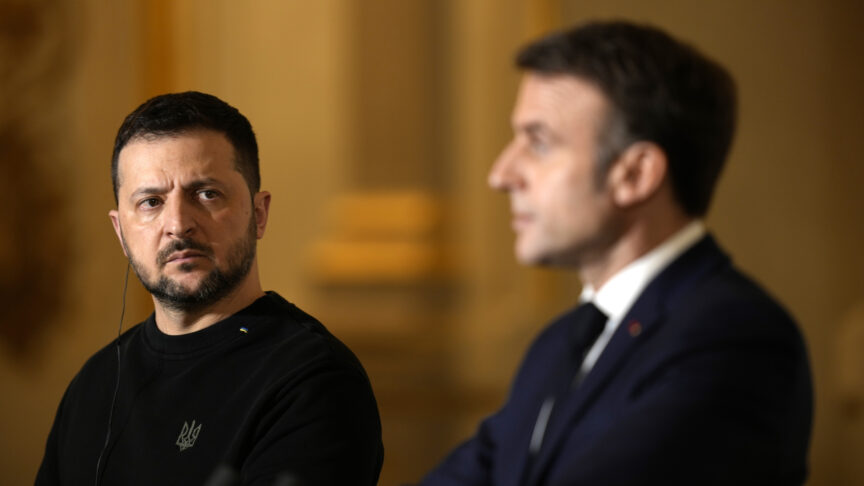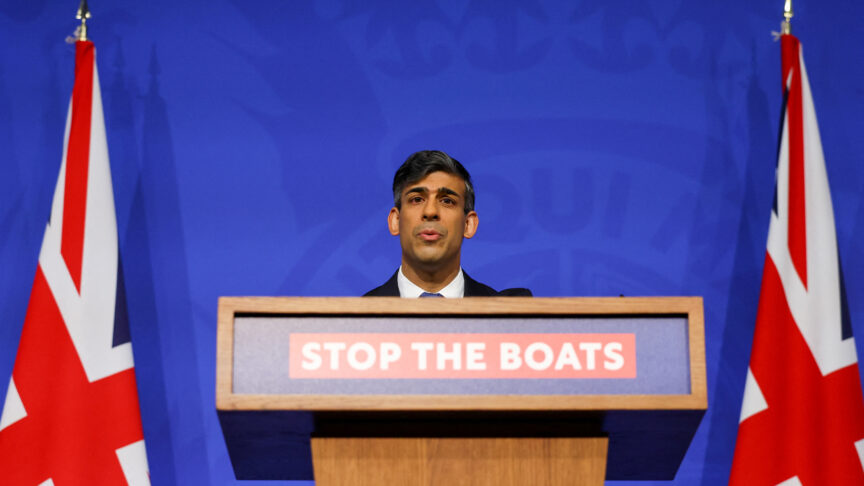Nick Clegg and a very European election
The emergence of Nick Clegg in the British election campaign means Europe is an issue that can no longer be ignored by the other candidates
Is Britain, the EU’s most awkward member, about to get its first genuinely pro-European prime minister? With the Liberal Democrats surging in the polls, their leader, Nick Clegg, a former MEP and European Commission official, may be on the brink of power – upturning not only British politics but European perception of Perfidious Albion. The excitement is almost audible across the English Channel.
But can the Liberal Democrats really win power if the numbers remain the same in the final weeks of the campaign and the remaining TV debates improve Nick Clegg’s image further? No – and yes. No, Nick Clegg is unlikely to lead the largest party in parliament after the election. But yes, the Sheffield MP can become the second most powerful man in Britain and possibly even the country’s leader.
As Britain’s electoral system is a “first-past-the-post” – with single member constituency that have to be won by a simple majority – the Liberal Democrats have very little chance of becoming the biggest party in the House of Commons. They need to be polling 40 percent at this stage for that to happen. On a uniform swing of recent polling, Labour would remain the largest party in parliament and the Liberal Democrats would be the third largest party, with the Tories the second largest party.
But assuming the polls are accurate and will hold (an admittedly large assumption in a very fluid campaign) there are only a few options. As Gordon Brown is already prime minister, he would remain in No 10 after the election until Parliament meets for the first time and he has a chance to test whether he can command a majority. Behind the scenes he will be trying to negotiate a deal with the Liberal Democrats. If Brown fails, he would go to the House, probably lose a motion of confidence and go to the Palace to resign. He could try to ask the Queen for another election, but Her Majesty would probably not grant one.
In this scenario, the Queen would probably summon the leader of the second largest party, David Cameron, and he would try to succeed where Labour failed – in forming a pact with the Liberal Democrats. If he succeeds, then he will govern. If he fails, the Tory leader is likely to ask the Queen for dissolution of parliament and a new election – which she may grant him.
So which party will the Liberal Democrats want to partner with? There is a long history of Lib-Lab cooperation, stretching from 1903 to 1997. There is also cooperation between the parties in the Welsh and Scottish parliaments. But Nick Clegg has gone into the election as Mr Change. Propping up Labour for another 5 years with Gordon Brown at the helm will be difficult to explain. The Clegg-Brown relationship is also said to be poor.
But power is, after all, an aphrodisiac. It could all come down to what the Liberal Democrats would be able to extract from Labour. They could demand, as a price for their support, that Gordon Brown steps aside for someone like David Miliband, or the Home Secretary, Alan Johnson. Or they could accept the continuation of Brown’s premiership, but with a number of jobs for Liberal Democrat spokesmen as well as concessions on issues like reform of the voting system, Trident and the Euro etc. Or, most dramatically, the Liberal Democrats could demand the role of senior party in a coalition making Nick Clegg the prime minister.
Brown and Clegg could fail to agree the terms of a deal. In this case, the mantle would be passed to David Cameron who would try his hand at a coalition with the Liberal Democrats. A Con-Lib deal would be very unpopular among Tory and Lib Democrat members. But both parliamentary parties could probably wear a coalition – depending own what they get in return. The bigger question may be whether they could make a coalition a success? Julian Astle, who was once an aide to Paddy Ashdown, urges caution: “The continuing poor relations between the parties are also a result of something more fundamental: the belief, held by virtually every Liberal Democrat, that the Conservative party has not been engaged in as fundamental a re-invention as David Cameron would like voters to believe.”
But despite this, under Nick Clegg the Liberal Democrats have been moving quietly to the right on economics, while the Tories under David Cameron have moved towards the Liberal Democrats on the environment, climate change, overseas aid and localism. Cameron and Clegg also agree on the civil liberties agenda, and the abolition of identity cards. The Liberal Democrats back Conservative plans for Swedish-style market-driven school reform.
But a number of serious stumbling blocks remain to a Cameron-Clegg government. The two leaders disagree – in quite a fundamental way – on Britain’s relationship with Europe. Cameron is a euro-sceptic, Clegg a euro-enthusiast who would even like Britain to join the Euro, even if it takes time for this to happen.
An even bigger problem for any Con-Lib coalition is electoral reform. The price that the Liberal Democrats would demand in return for their support is usually cited as including electoral reform: a move away from first past the post (FPTP) elections to the House of Commons and towards a more proportional system. Both Labour and the Conservatives benefit greatly from FPTP, which exaggerates the number of seats awarded to the winning party, meaning a government with an overall majority can be elected with barely a third of the popular vote. The Liberal Democrats would be the major winners if a form of proportional representation were to be used. The Conservatives oppose PR out of principle and expediency. But politics is the art of the possible; the Tories could use the economic crisis to postpone the issue, offering a review.
The most important part of any Lib-Con pact would, however, involve the economy. The Conservatives and the Liberal Democrats do not agree on key issues either – like what to do about bonuses, banks, taxes etc. How the two parties will resolve these differences are a mystery.
Would any coalitions actually hold? If history is any guide, then the answer is no. In the 20th century there have only been four hung parliaments. But none of them have lasted more than two years. There is also a deeply held suspicion against coalition governments, not least in the financial markets. But these are extraordinary times, and voters may want to see their politicians buck the old trends. This may become Britain’s most European election yet.
For more on the British election…
Read Daniel Korski’s latest paper – Britain’s ‘European’ Election.
Podcasts
Mark Leonard on what the British Conservatives think about foreign policy. Click here for the audio.
Daniel Korski on the start of the British election campaign. Click here for audio.
ECFR experts available for press interviews and analysis on the European and foreign policy aspects of the British election. For ECFR’s press office, call +44 7787 431 820 or email [email protected]
The European Council on Foreign Relations does not take collective positions. ECFR publications only represent the views of their individual authors.


